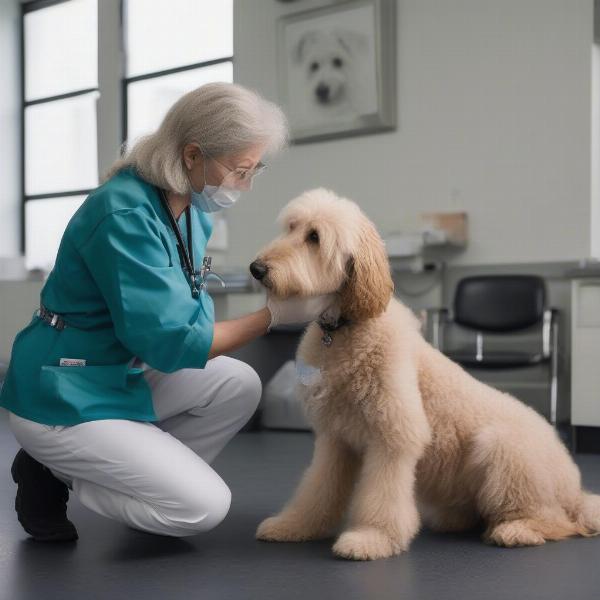Making the heartbreaking decision to euthanize a beloved Goldendoodle is never easy. It’s a deeply personal choice, often filled with grief, guilt, and uncertainty. This article aims to provide guidance and support for Goldendoodle owners facing this difficult situation, offering insights into when euthanasia might be the most compassionate option. Understanding the signs, considering quality of life, and consulting with your veterinarian are crucial steps in this process.
Quality of life is the most important factor to consider when deciding if it’s time to say goodbye to your furry friend. While it’s painful to contemplate, focusing on your Goldendoodle’s comfort and well-being is paramount. Consider their ability to eat, sleep, move, and engage in activities they once enjoyed. Are they experiencing chronic pain that medication can no longer manage? Are they struggling to breathe or eliminate waste? Honest answers to these questions will help guide you toward the most compassionate decision.
Recognizing the Signs: When is it Time?
Several indicators may suggest that your Goldendoodle’s quality of life is declining and euthanasia might be the kindest choice. These signs can be physical, behavioral, or a combination of both. Loss of appetite, lethargy, difficulty breathing, incontinence, and chronic pain are common physical signs. Behavioral changes can include withdrawal, aggression, fear, and a loss of interest in their surroundings.
It’s essential to remember that each dog is an individual, and the progression of illness or decline varies. Observing subtle changes in your Goldendoodle’s behavior and routine can be crucial in recognizing when their quality of life is significantly diminished. Are they still wagging their tail? Do they still greet you with enthusiasm, however subdued? These small details can offer valuable insights.
Consulting with your Veterinarian: A Crucial Step
Your veterinarian is your most valuable resource during this challenging time. They can assess your Goldendoodle’s condition, diagnose underlying medical issues, and offer pain management strategies. They can also provide an objective perspective on your dog’s quality of life and help you navigate the decision-making process. Open communication with your veterinarian is crucial, allowing them to understand your concerns and provide tailored advice.
 Veterinarian Examining a Senior Goldendoodle
Veterinarian Examining a Senior Goldendoodle
Don’t hesitate to ask your veterinarian specific questions about your Goldendoodle’s prognosis, pain levels, and potential treatment options. Discuss your concerns about quality of life and explore end-of-life care options, including hospice and palliative care.
Saying Goodbye: Making the Euthanasia Decision
The decision to euthanize a pet is intensely personal. There’s no right or wrong answer, only what feels right for you and your Goldendoodle. Consider your dog’s overall well-being, their ability to enjoy life, and their level of suffering. Talk to your family members, especially children, and explain the situation with sensitivity and honesty.
Coping with Grief: After the Loss
Losing a pet is a significant loss, and the grief can be profound. Allow yourself time to grieve, and don’t hesitate to seek support from friends, family, or a pet loss support group. Remember the joy and love your Goldendoodle brought into your life, and cherish the memories you shared. Creating a memorial, planting a tree, or donating to an animal shelter in their name can be meaningful ways to honor their memory.
Conclusion: A Peaceful Farewell
The decision to euthanize a Goldendoodle is undoubtedly one of the most difficult decisions a pet owner will ever face. By carefully considering your dog’s quality of life, consulting with your veterinarian, and focusing on providing comfort and peace, you can ensure a compassionate and loving farewell to your cherished companion.
FAQ:
- How do I know if my Goldendoodle is in pain? Look for signs such as panting, restlessness, whining, changes in appetite, and reluctance to move or be touched.
- What happens during euthanasia? Your veterinarian will typically administer a sedative followed by an overdose of a barbiturate, which causes the heart to stop peacefully.
- Can I be present during the procedure? Yes, most veterinarians allow and encourage owners to be present to provide comfort to their pet.
- What should I do with my Goldendoodle’s remains? You can choose between cremation or burial, depending on your preference and local regulations.
- How can I help my other pets cope with the loss? Maintain their routine as much as possible, and provide extra attention and affection. Allow them to sniff and investigate their companion’s belongings if they wish.
- How can I cope with the grief of losing my Goldendoodle? Allow yourself time to grieve, and don’t hesitate to seek support from friends, family, or a pet loss support group.
- Are there any alternative options to euthanasia? Discuss palliative care and hospice options with your veterinarian to explore ways to manage your dog’s pain and discomfort at home.
You might also be interested in these other articles:
(If applicable, insert links to relevant articles on your website here)
About ILM Dog:
ILM Dog is your trusted resource for all things dog-related. We offer expert advice and resources on dog breeds, health, training, nutrition, grooming, and much more. From choosing the right breed to providing end-of-life care, we are dedicated to helping you navigate every stage of your dog’s life. For any questions or further assistance, feel free to contact us at [email protected] or call us at +44 20-3965-8624. Visit ILM Dog for more information.